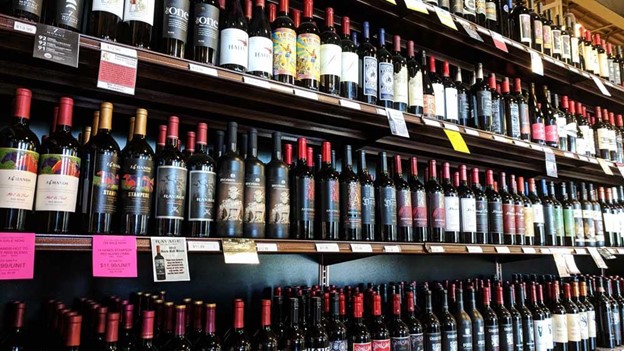In November 2022, Proposition 125, allowing the sale of wine in grocery and convenience stores, was narrowly passed by voters. No DUI Larimer took a stance against Proposition 125 on safety grounds, arguing that it would increase access to underage and intoxicated consumers. Six months after it passed, our steering committee has received some alarming community feedback about the impacts of Proposition 125 in Larimer County.
The Safety Impact of Proposition 125 in Larimer County
Underage Consumers Purchase Alcohol Through Self-Checkout
Being able to purchase wine in grocery stores is convenient, and perceived as relatively safe, by most shoppers of legal age. Unfortunately, Proposition 125 has had a negative impact on community safety. Since the pandemic, and with the continuing labor shortage, self-checkouts have become the standard. In many grocery stores, there are now more self-checkouts than conventional checkout lines.
With one employee monitoring several self-checkout stations, it’s easy for underage consumers to slip through the cracks. Though ID-checking is required by law, in our experience in our community, ID checks (particularly at self-checkout) are lax. It is common for the self-checkout monitor to be a minor themselves, putting the responsibility for responsible alcohol sales on young people who cannot legally drink themselves.

Underage Consumers Can Easily Shoplift Alcohol from Grocery and Convenience Stores
Ten percent of Americans have shoplifted in their lifetime, and that number is on the rise. Large grocery stores often have multiple exits and are difficult to monitor, making them targets for shoplifters. Shoplifting a bottle of wine is much easier for an underage shopper than it would be at a small store that sells only liquor. Josh Beard, owner of Bullfrog Wine & Spirits and Mulberry MAX, told us he now finds empty wine bottles at the back of his store adjacent to a large grocery store – and they are not wines his store carries.
Grocery Stores Have Less Training for Staff and Higher Turnover
Grocery stores train staff to know the ins and outs of a grocery store; they do not train them to know the ins and outs of safe alcohol sales. Additionally, federal law requires grocery store employees to be at least 14 years old. Liquor store employees must be at least 18. Grocery stores see frequent employee turnover, especially in young employees working over the summer or around changing school schedules.
Liquor stores often provide special training for their employees. A main focus is on safe alcohol sales, and many Larimer County liquor stores choose to be part of voluntary training and compliance programs such as our own RAR (Responsible Association of Retailers). Compliance checks or stings for underage alcohol sales are also common for liquor retailers in Colorado.
“We have deeper and longer connections with our customers, our work and compliance expectations, and the effects of alcohol,” says Beard. “I’ve seen [my staff] take a moment with someone who’s intoxicated or overindulged, offer them a seat and a bottle of water to collect themselves. I’ve seen them follow up the next day after a refusal of service for visual intoxication to check if a person made it home ok.”

Intoxicated Shoppers Can Purchase More Alcohol at Grocery and Convenience Stores
Liquor store employees are trained to look for signs of customer intoxication, and they hone those recognition skills over years in the industry. They receive training on how to handle intoxicated customers, including how to politely refuse a sale, or what to do when a customer becomes belligerent or even violent.
Imagine being a 14-year-old checkout clerk at a grocery store and trying to refuse alcohol to an intoxicated adult who is making threats. It’s no wonder we see higher rates of over-served customers who visit grocery and convenience stores instead of liquor stores. And, when people have had too much to drink, they are much more likely to exhibit poor judgment by getting behind the wheel, and much more likely to cause an accident if they do.
Beard remembers one particular instance where an intoxicated man was refused a sale at his store, Bullfrog Wine & Spirits. Beard witnessed the man walk over to the nextdoor grocery store and walk out minutes later with a six-pack of beer. “I’m convinced this is happening more than I can report seeing personally,” he said, “and my observation is that IDing is pretty lax at the grocery store adjacent to us.”
Oversight of Grocery and Convenience Store Alcohol Sales is Limited
While there are nearly double the number of retailers selling wine in Colorado since before March 2023, there is no increased enforcement or oversight. There is no consultation with local municipalities and communities about the needs/desires of more alcohol availability in a community. We know that increased availability leads to increased use, and increased use means more underage consumers, more intoxicated consumers, and more drunk drivers on our roads. If you drive in Larimer County, or know someone who does, this should concern you.
The Economic Impact of Proposition 125 in Larimer County
Our goal is for Larimer County to be a healthy community in all aspects, including economic health. We know that economically healthy communities have lower rates of substance abuse, including alcohol.

Costs for Liquor Store Customers are Higher
There is not a higher percentage of alcohol-buying customers than existed prior to March 2023, simply more places to buy it, many of them less regulated. Not only does this mean increased safety risks for consumers, it means increased prices through safe purchase channels.
Larimer County alcohol distributors now must deliver to more stores. They have had to upsize their fleets and staff, an expense that is passed to liquor stores. Without more paying customers, the cost per customer increases, and the cost of products follows suit. Nationwide chain stores have massive distribution systems, which means any scaling up affects each individual consumer less.
Customers Will See Less Product Variety
“In the long run, it’s looking like this will cost consumers more and their selection of niche and interesting products, which will fade away as independent retailers draw back or die and big chains continue to drive volume with the top-selling, most ubiquitous brands,” said Beard. “Aggressive chain stores can afford to take razor-thin margins – sometimes 5 cents on a $19 purchase – for as long as it takes to strangle their competition, and when that’s gone, they can do whatever they want with pricing.
Prop 125 has created a bleak outlook for the owners of small, local liquor stores we spoke with. “It is beyond sad to see so many hardworking local retailers across the state have the rug pulled out from under their livelihoods in less than 100 days’ time,” said Beard. He notes that the purpose of Colorado’s ‘Great Compromise’ struck in 2016 was to give independent Colorado alcohol retailers selling full-strength beer a 10-20 year off-ramp to divest before being put out of business by corporations.
“While I’m not comfortable sharing hard statistics, suffice it to say that customer counts are down, sales are down, and the need for labor is down,” said Beard. “Costs are up. All of those are in bigger numbers than I’ve seen over 19 years in the industry.”
What You Can Do to Offset the Negative Impacts of Proposition 125
We know picking up a bottle of wine at the grocery store is convenient, and if you are an of-age adult consuming alcohol responsibly, it’s also safe. The problem with these purchases is they put dollars in corporate pockets while putting safer alcohol sales operations out of business.

The simplest thing each of us can do is to continue to purchase alcohol from liquor stores and bars. We can continue to support small, local businesses staffed by people who live and work here and hold community safety as a top priority.
Access is the greatest risk factor for youth substance abuse. Everyone can be part of the solution to end impaired driving in Larimer County. Vote with your dollars, and Make the Right Call – for yourself and for others.


![Partners [Logo Reversed]](https://poweredbypartners.org/wp-content/uploads/2020/06/partners-horiz-no-tag-sm-rgb-color-purple.png)